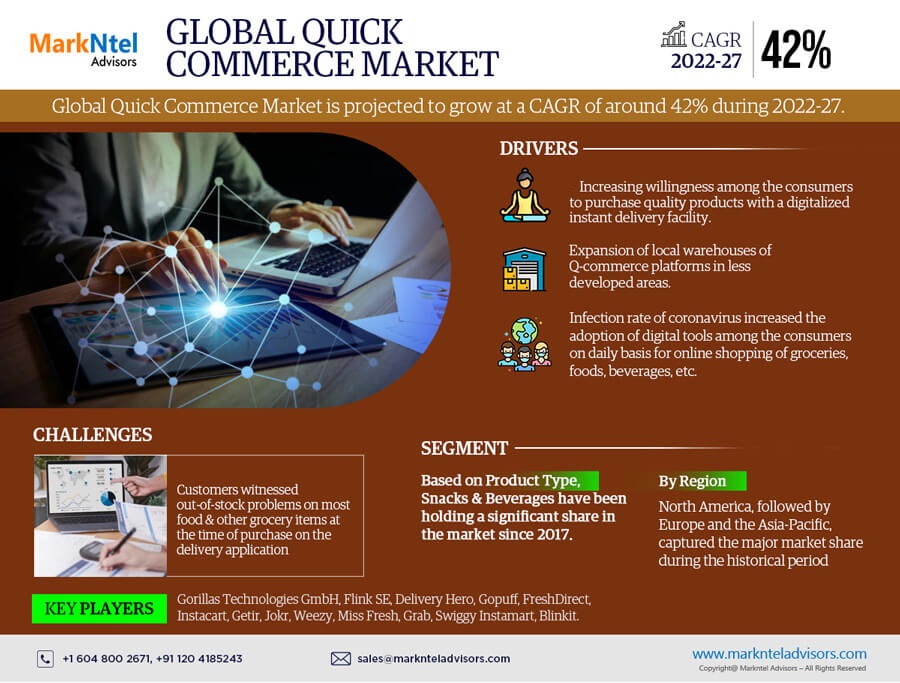Accelerating Convenience: The Global Surge in Quick Commerce (Q-Commerce)
The Global Quick Commerce (Q-Commerce) market is expected to grow at a CAGR of around 42% during the forecast period of 2022-27, says MarkNtel Advisors in their recent research report. The advent of COVID-19 has led retail companies to change the way of doing business. These companies have started adopting e-commerce platforms at the forefront of retail. In addition, the growing need of customers for speed & convenient delivery of food & other grocery products has given rise to the new e-commerce platform, i.e., quick commerce, which is characterized by ultra-fast delivery, i.e., within 10-30 minutes.
Moreover, the rising consumer need to buy quality products, increasing disposable income of the population, urbanization, and rise in geriatric population are some of the major factors propelling the growth of Quick commerce across the globe. Furthermore, curbing the growing inclination of customers to purchase products at their doorstep has led companies to expand their business by opening new dark stores across their regions. In January 2022, Blinkit announced that by March 2022, the company would have 1,000 mini distribution centers to enhance quick delivery.
Additionally, companies are also expanding by raising their funding to open new warehousing stores to fulfill the growing requirement of instant delivery as well as increase the accessibility of day-to-day home essentials. In 2021, Gorillas, Germany, raised about USD950 million in funding with the objective to deliver groceries, booze, and other customer requirements within 20 minutes or less at their doorstep. Hence, the growing investments, as well as the establishment of new dark stores within the countries would further bolster the quick commerce market during the forecast period.

Snacks & Beverages Captured the Major Market
Based on the product type, the market bifurcates into Grocery, Snacks & beverages, Bath 7 Beauty, Baby Essentials, Home care, and Other. Among them, Snacks & Beverages showed a considerable share in the Global Quick Commerce (Q-commerce) market during the historical period. The major factors attributed to its growth are driven by the rising demand for juices, potato chips, cakes, baked biscuits, etc., among children, youth, & other age groups in countries like the US, Canada, China, France, the UAE, etc. Moreover, the easy availability of a varied range of products in snacks & beverages pushed customers to adopt quick commerce for instant delivery.
Furthermore, in these countries, customers are more prone to adopt quick commerce platforms owing to the growing prevalence of work-from-home policy, social distancing, and government restrictive measures to safeguard public health & minimize the spread of the virus, hence accelerating the market of quick commerce globally.
North America Held a Significant Share in the Quick Commerce Market
Geographically, North America witnessed exponential growth in the Quick Commerce (Q-Commerce) market during the historical period. The foremost reason for the expansion of the quick commerce market is the existence of key market players like GoPuff, JOKR, Instacart Buyk, etc. These Quick Commerce companies are establishing new dark stores & adding new retail partners apart from the grocery business to enhance their customer base. In 2021, Instacart added apparel (H&M), beauty (Sephora), general merchandise (Big Lots), and prescription delivery (Costco) to its product portfolio to increase its network density & delivery platforms. Further, these market players are emphasizing on improving their delivery platforms as well as adding other product segments to cater to the growing need of customers to provide the product within a minimal period.
In addition, the other factor surging the growth of quick commerce in the countries like the US, Canada, and Mexico of North America is due to the changing lifestyles, smaller households, urbanization as well as aging populations, which necessitated the need for quick delivery of day-to-day essentials. Thus, the rising adoption of Q-commerce delivery platforms enables customers to prefer least store visits, which would further boost the Q-commerce market in the foreseen years, reveals MarkNtel Advisors in their recent research report, "Global Quick Commerce Market Analysis, 2022-27."
Key Competitors
According to MarkNtel Advisors, the leading players in the Global Quick Commerce Market are Gorillas Technologies GmbH, Flink SE, Delivery Hero, GoPuff, FreshDirect, Instacart, Getir, Jokr, Weezy, Miss Fresh, Grab, Swiggy Instamart, Blinkit.
Key Questions Answered in the Study
- What are the current & future trends in the Global Quick Commerce Market?
- How has the industry been evolving in terms of geography & product adoption?
- How has the competition been shaping across various countries, followed by their comparative landscape?
- What are the key growth drivers & challenges for the Global Quick Commerce Market?
- What are the customer orientation, purchase behavior, and expectations from product manufacturers across various regions?
Market Segmentation:
- By Product Type (Grocery, Snacks & Beverages, Bath & Beauty, Baby Essentials, Home Care)
- By Region (North America, South America, Europe, Middle East & Africa, Asia Pacific)
- By Competitors (Gorillas Technologies GmbH, Flink SE, Delivery Hero, Gopuff, FreshDirect, Instacart, Getir, Jokr, Weezy, Miss Fresh, Grab, Swiggy Instamart, Blinkit)


Comments
Post a Comment